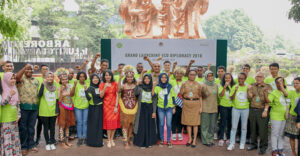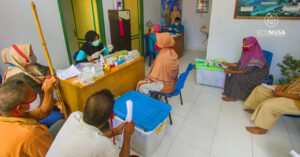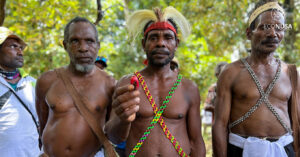
Whether or not we are aware that nearly all of our activities are always linked to forests. It does not matter how far we reside from forest area and what our lifestyle is. What we drink daily is connected to forest. Without forest, there is no water spring to meet our need.
Many aspects of life are derived from forest, including the air we breathe. Forest plays its major role to capture air pollutant. In addition, paper, medicine, food are just small parts of benefits from forests that cover one third of land in the Earth.
However, forest area change has brought about ecological catastrophe. There is no more tree that catch and keep water. Consequently, landslide and massive flood happened as it recently did in South Kalimantan. Extreme downpour with overfilled land has inundated more than 10,000 houses in 11 regencies/cities.
Deforestation
In a wider scope, the change of forest function or deforestation has accelerated global warming. Deforestation has released carbon dioxide to the atmosphere from trees and land. Climate change, rising sea level, potential new ailment due to zoonosis are the ticking time bomb. Some researchers worried if an ancient virus comes up following the melting ice in the north pole.
The awareness on the importance of forest existence in the world has been recorded as the World Forest Day every 21 March. It is based on the A/RES/67/200 resolution issued by the United Nations’ General Assembly in 2012. Meanwhile, Indonesia’s civil society organizations propose 7 August as the Indonesia Forest Day.
However, forests are not free from threat. Deforestation keeps happening every year with different size. Indonesia is on the top 10 of largest countries with the loss of 339,888 hectares of tropical forests in 2018. The deforestation was caused by land clearance for habitation, palm oil plantation expansion and forest fires.
The highest deforestation rate in Indonesia, 3.51 million hectares, happened in 1996-2000. The second largest deforestation with 1.09 million hectares occurred in 2014-2015. Riau Province in Sumatera and West Kalimantan in Kalimantan are the top two provinces with the highest deforestation following the deforestation happened in 2001-2019 as around 3.8 million hectares of forests in Riau and 3.5 million hectares in West Kalimantan have gone. The respective level of deforestation happened to Central Kalimantan with 3.4 million hectares of loss, East Kalimantan 3.3 million hectares and South Sumatera 2.8 million hectares of loss.
Currently, the largest forests in Indonesia are in Tanah Papua with the remaining 40 percent of primary forests in Papua and West Papua Provinces. The largest biodiversity in Indonesia with 602 kinds of birds, 125 types of mammalian and 223 types of reptiles are also in Tanah Papua.
Hence, it is no wonder that Tanah Papua is deemed the last frontier of Indonesian forests. It is not too much to cite a senior singer, Franky Sahilatua, song lyric as saying “… the falling paradise in the earth …”
Struggling for paradise
As if heaven imagined by all religious beliefs, forests in Tanah Papua are analogous to heaven. They are not simply the habitations of thousands of species, the “paradise” is also the dwelling of local community living mutually with forests. They call forests as their “mamma” who grants them livelihood.
The National Forestry Plan (RKN) 2011-2030 of the Ministry of Environment and Forestry mentioned that 118,963 families of indigenous community in Tanah Papua are categorized as forests earners and 137,672 families as running business on forestry. The data show the number of families who lose their livelihood and culture when forests are gone due to land use change.
In 2021, EcoNusa Foundation will focus on the development of village potentials in Tanah Papua and Maluku Island. There are various initiatives development made by the grassroot communities so as to create independence in natural resources management and food resilience.
Despite the lingering Covid-19 pandemic in Indonesia, EcoNusa CEO Bustar Maitar asserted that EcoNusa makes every effort to stay relevant to indigenous community in Tanah Papua. That is the community mandate performed by EcoNusa.
However, every hard work to put ecosystem in balance requires strong commitment, struggle, persistence and patience. Reforestation for instance, will take years to get an ideal forests cover. In such a process, it is possible that the planted trees will be cut off over and over to meet market demand and economic growth.
Amidst the rampant deforestation, striving for ecosystem balance and equal natural resources management need tough effort as told by Sisifus story in Greek mythology. Sisifus was punished by pushing a rock to the tip of a mountain and the rock kept falling down. Sisifus kept on working on the useless labor along his life. But now, to make Earth worthy for living, it is also worth to fight for that kind of work so as not to be in vain.
Editor: Leo Wahyudi







